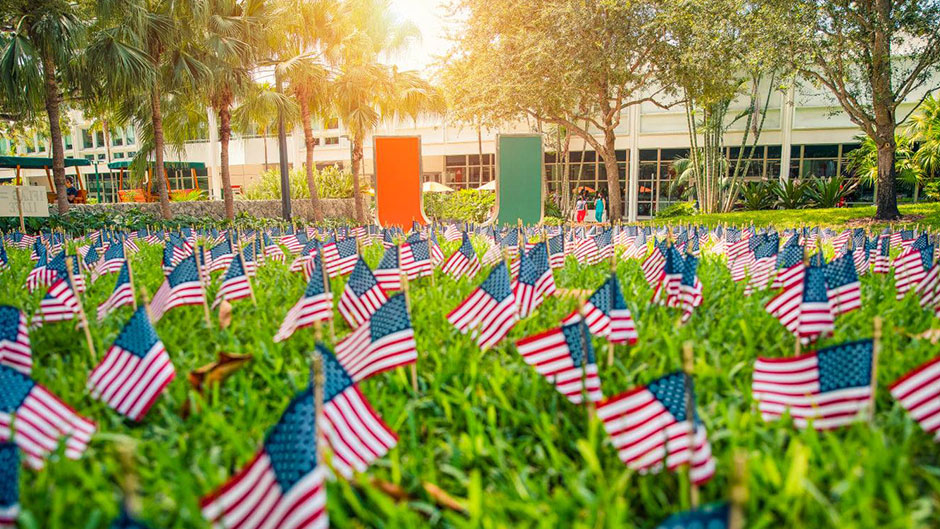Military veterans have played a key role in shaping the University of Miami. In 1945, servicemen returning from World War II helped triple the University’s enrollment to more than 6,900. Since then, the University has continued to welcome and support veterans through programs and resources that have earned it high marks in various rankings of veteran-friendly colleges.
Our ’Cane veterans come from different backgrounds and walks of life, and while their experiences in the military differ, they all share a commitment to serving their country and making an impact in their community. Below, we meet five of them.
If you are a ’Cane veteran, contact Carol Shipman at carolshipman@miami.edu to learn how you can get involved with the Alumni Veterans Affinity Group.
Bryan Day, M.A.I.A. ’19
President, Alumni Veterans Affinity Group
Growing up in Miami in the 1980s and 90s, Bryan Day was a diehard Miami Hurricanes football fan and an Orange Bowl regular. He dreamed of attending the U, but finances were a factor, so after graduating high school, he decided to join the U.S. Army. “My cousin was an Army Ranger,” Day said. “When I heard his stories, I knew this was how I would get the funding for school, through earning G.I. Bill benefits.”
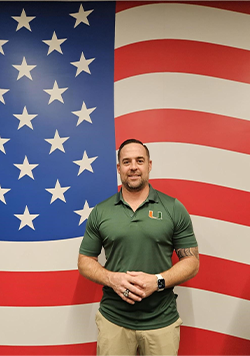
Day’s first contract ended not long after the September 11 attacks, and he immediately re-enlisted. Multiple tours of combat duty in Afghanistan and Iraq followed. In 2002, he was coming out of the Afghan mountains in the aftermath of a combat operation when he encountered a South Florida news crew. They asked him if he weren’t there, what he would be doing. “I told [the reporter] I would be going to the University of Miami,” he recalled.
Day served a total of 15 years in the Army, after which he became a military contractor and did two additional tours in Iraq, providing security at embassies in Baghdad. Following the second tour Day decided, “it was time to seek an education.”
From talking to friends from the University’s Veterans Student Organization, he learned about the numerous ways the U supports veteran students. He applied to the University under the Veterans Administration (VA) vocational rehabilitation program and earned his master’s degree in international administration. He currently works in Washington, D.C., for the Department of Homeland Security.
One of Day’s brightest memories of his time as a student was when the Hurricanes hosted Notre Dame in November 2017. “I was on the field holding the American flag before the game, and then watched the U take care of business and win. Memories like this and the ones from when I was a kid are the reasons why I love the U so much. The minute I heard that the veterans’ affinity group needed help, I stepped up.”
Eric Golnick, B.A. ’09, M.A.I.A. ’14
Vice President, Alumni Veterans Affinity Group
Eric Golnick has experienced firsthand how mental trauma can blight the lives of those who serve. He has spent much of his post-military career helping fellow veterans, active-duty military members, and first responders get quality, affordable mental health care.

After graduating with honors from the University of Miami, he attended the U.S. Navy’s Officer Candidate School and was commissioned as a naval officer. He looks back on his naval career with pride and gratitude but, as he recalled, “it wasn’t all glamorous.”
Golnick participated in multiple operations and exercises throughout Asia, including serving with the Commander of U.S. Naval forces in Japan. In this position, he helped plan and conduct emergency disaster relief operations during the 2011 earthquake, tsunami, and nuclear meltdown at the Fukushima nuclear power plant.
It was the impact of that and other experiences, plus the emptiness that he felt after his time in the Navy ended, that led to substance abuse, for which he spent years seeking appropriate treatment. After finally getting the right help, and a diagnosis of post-traumatic stress disorder (PTSD), he co-founded Forge Health, dedicated to improving the mental health and well-being of veterans, active-duty service members, first responders, and their families.
Golnick secured a national-level partnership with the VA, the first of its kind, in 2018. Since then, he has created greater access to care through strategic partnerships with multiple national veterans and first responder organizations. He is an expert witness to the House Veterans Affairs Committee on veteran mental health and behavioral health operations, and he sits on multiple state-level suicide prevention working groups.
His tireless work on behalf fellow veterans and engagement with the University recently earned Golnick a rare accolade from the his alma mater: an honorary Doctor of Humane Letters degree and an invitation to speak at commencement next spring. "It is an absolute honor of a lifetime," Golnick said. "It definitely has been a journey since graduating from the U, from joining the military soon after, to a rough transition back to the civilian world. I can only think of the wonderful mentors and friends from University of Miami who helped me get to where I am today."
Shawn Marcotte, B.A. ’85
Secretary, Alumni Veterans Affinity Group
A 1985 graduate of the University, Miami native and lifelong Hurricanes fan Shawn Marcotte is a third-generation soldier, but his path to the military took an unexpected detour just as it started.
“Military service is a Marcotte family tradition,” he said. “I had enlisted in the U.S. Army and was on my way to basic training, then off to Germany for four years.” Before he left, he sifted through a stack of mail at his home and found the offer of an R.O.T.C. scholarship to any university that would accept him.
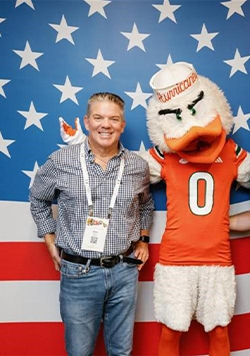
“I drove straight to the UM campus and asked for directions to the R.O.T.C. headquarters. They took me on, and I successfully put the recruiter off,” he recalled.
Marcotte completed 30 years of service in the Army in 2015, retiring with the rank of colonel. He initially served with the 18th Airborne Corps as a helicopter pilot, deploying to the Middle East, and subsequently on the Korean peninsula with the Second Infantry Division. He also served on deployments throughout South America.
Looking back on his career, Marcotte reflected on the lessons he learned and how he stays connected both to the U and his military heritage. “The Army family is a strong one, and since the military is an expeditionary force, designed to serve outside U.S. borders, I learned a lot about how the world is and how fortunate we are as Americans. I am grateful for this nation, and I give thanks to those who are serving today to defend our freedom.
“I stay connected to UM, particularly through the Veterans Services office. We are blessed that the U continues to dedicate resources committed to supporting service members.”
G. Holmes Braddock, B.A. ’49, M.Ed. ’53
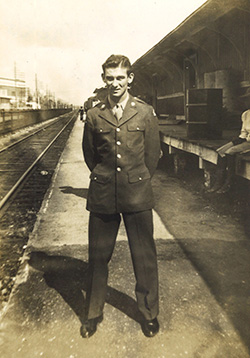
G. Holmes Braddock was in the first postwar class of student veterans who attended the University of Miami on the original G.I. Bill. As he recalled, “being a small-town boy, married and coming to UM on the G.I. Bill after serving in World War II, I was in ‘high cotton.’”
Braddock first tried to enlist on December 7, 1942, the first anniversary of the attack on Pearl Harbor. He was 17. “Three friends and I came to Miami to enlist in the Marines,” he said. “They were accepted, but I was turned down for both the Marines and Navy because of a preexisting medical condition. A year later the Army drafted me, and I served as a medic on an Army hospital ship.”
Braddock’s most vivid memory of his wartime service was picking up wounded service personnel from the D-Day landings in June 1944 and continuing throughout Europe until Victory in Europe (V-E) Day, on May 8, 1945. In 1946, he enrolled at the U, where he studied communication and was inducted into Iron Arrow, the University’s premier honor society. Later, he earned his master's degree in education, the prelude to a lifetime advocating for public education.
An insurance agent by profession, Braddock served on the Miami-Dade County School Board for 38 years. He was instrumental in desegregating the school system in the 1960s and was a champion of bilingual education, the inclusion of a student representative on the school board, and many other reforms. In 1989 the school district named a new high school in Braddock’s honor.
At age 97, Braddock stays active in the Miami community, including serving on the board of directors of the University of Miami Sports Hall of Fame and with the Golden Ibis Homecoming Committee. Above all, he is a diehard ’Canes fan, a football season ticket holder since 1946, and a baseball season ticket holder since that program’s inception.
Christopher Weidlich, B.S.N. ’95, Ph.D. ’13
As assistant professor of clinical in the School of Nursing and Health Studies, Christopher Weidlich draws on his own military experience for inspiration as he trains the next generation of nurses.
During his time in the U.S. Army, Weidlich learned “that communication is essential. There is little room for error in life-and-death situations. Being able to be clear and listen to others is key. And everyone contributes to the team’s overall success.”
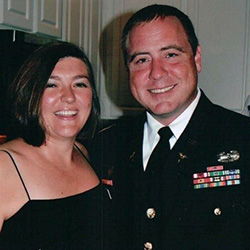
After high school, Weidlich received an Army R.O.T.C. scholarship and enrolled at the University of Miami to study nursing. “I had always felt a calling toward public service and helping others, which is something I have been able to do throughout my career,” he explained.
While at the U, Weidlich met his future wife, Robin Stewart, B.A. ’94. He looks back with fondness on his undergraduate years, particularly the excitement on campus generated by the success of the Hurricanes football team.
After graduation, Weidlich embarked on an Army career that included service in Iraq. “Being the commander of two medical units deployed to Iraq, I was able to work with some of the best people you could ever imagine,” he recalled. “They were the true heroes who saved many lives. Many people are alive today because of their actions and that is something I am very proud to be associated with.”
After retiring from the Army, Weidlich returned to the University to earn his doctorate in nursing, and eventually got what he calls his dream job, on the faculty of his alma mater. His research focuses on mental resiliency in military health care providers, insomnia treatment of service members with PTSD and substance abuse, and the mental health concerns of urban search-and-rescue firefighters.
As for his teaching, Weidlich loves that he can “interact with the next generation of nursing students, imparting knowledge that I have learned to help them become the superb nurses we need in today’s world.”
How the U supports veterans
The University participates in federal and state initiatives that help veterans, active-duty service members, and/or their dependents pay for their degrees, such as the G.I. Bill, the Yellow Ribbon Program, and the Scholarships for Children and Spouses of Deceased or Disabled Veterans.
In addition, the University offers scholarships specifically geared toward veterans with financial needs, including the Col. Alice A. Kerr Veterans Scholarship and the Tillman Military Scholars Program. The Hurricane Heroes Endowed Scholarship, established with a gift from Walter Penberthy, M.B.A. ’91, supports graduate students in the Miami Herbert Business School who have served in the military or are disabled.
Most recently, Col. Thomas Duquette, B.S.Ed. ’83, and his wife, Lt. Col. Sherri Maxwell, O.D., who served a combined 60 years in the military, made a gift to the Miller School of Medicine to support scholarships for veterans pursuing degrees in physical therapy. You can read more about their gift here.
Several on-campus resources are available to help with benefits and the transition to civilian life, including Veterans’ Affairs Certifying Officials, programs at the University Counseling Center, the Veteran Employee Resource Group, and career planning and tutoring geared for vets. The Veteran Student Organization provides support and extensive networking resources for veterans as they adapt to student life.
